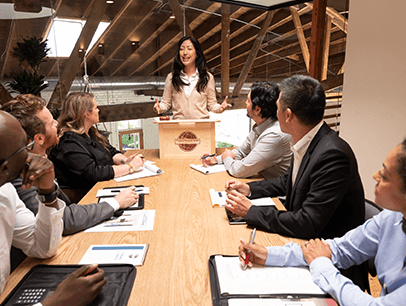Toastmasters is “Where Leaders Are Made,” and executing a well-planned leadership project is an essential step in the process; simply put, you can’t achieve Distinguished Toastmaster (DTM) without it.
This leadership project, called a DTM project, requires members to create and implement a project of their own design, in which they demonstrate the skills and expertise they have gained. Many members, however, go beyond just completing the requirements so they can check off a box and move on. Instead, they pour themselves into the project and make it meaningful beyond their own success. Here, five Toastmasters share how they completed the requirement, including one member who used it to knock out her sixth DTM!

Clare Crowther, DTM, AS
Armada Speakers • Plymouth, England
- DTM Received: 2020
- DTM Project: “Mentoring for Mentors”
Clare Crowther created a mentoring program for her club, which wanted a robust mentor system but had only a few experienced members. She set up a project team of mentors—plus one new member who volunteered to contribute “newness perspective.” Next, she surveyed existing mentors about the support material they needed, which became her first challenge.
“For several weeks, the questionnaire questions seemed just beyond my grasp,” she says. She finally switched gears and, drawing on the Pathways mentoring program, simply talked to the mentors about what they needed. She asked three simple questions: How is your mentoring going now? What would most help you now? Thinking back to when you started, what would have been most useful then?
“Look for a problem that is crying out for a solution in your club, organization, or community. Listen to the opinions of the key people affected by the problem and build your solution accordingly.”
Clare Crowther, DTM, AS“I have loved talking with our mentors in this way,” she says. “They are all so inspirational!”
Crowther is still talking to the mentors and refining the program. “The final resource I envisage will have a series of links to relevant TI [Toastmasters International] articles and materials, plus bespoke Armada Speakers resources.”
Crowther, a speaker, executive coach, workshop facilitator, trainer, and project manager, says her project taught her the importance of involving others. “A resource produced for the benefit of an organization is more valuable when people from the organization personally contribute to its production.”
When it’s time for your DTM project, she suggests that you “look for a problem that is crying out for a solution in your club, organization, or community. Listen to the opinions of the key people affected by the problem and build your solution accordingly.”

Fred Haley, DTM
World Golf Village Toastmasters • St. Johns, Florida
- Third DTM Received: 2018
- HPL Project: “How to Win the Job at the Interview”
Wanting to help non-Toastmasters improve their job interview skills, Fred Haley developed a workshop and presented it at local public libraries. He also sought to encourage other members to conduct projects in the community, not just with Toastmasters-related projects in their clubs. He recruited club members to help organize, promote, and run the event, including registration and set-up.
“Toastmasters is not a destination. Toastmasters is a tool to help you advance your career, grow your business, and improve your relationships.”
Fred Haley, DTMHe created the workshop, designed handouts and PowerPoint slides, and then promoted the event at local libraries, in community calendars, and on social media.
“I only had a dozen attendees,” he says, “but three said it helped them get jobs and three expressed interest in joining Toastmasters.” A final bonus was that one of the attendees hired Haley to continue helping him get hired.
Haley, a retired public transportation manager now working as a communications coach, says he learned “we are developing skills in Toastmasters that can make a difference in the lives of others, and Toastmasters members want to be part of any action or project that can help others.” He also came to the realization that “Toastmasters is not a destination. Toastmasters is a tool to help you advance your career, grow your business, and improve your relationships.”
He advises finding a project that will have community service value. “Make it about something related to your career field or personal interests outside Toastmasters. And it’s okay to promote your own business.”

Lucinda Harman, DTM
Shilling Speakers • Havant, England and
Toastmasters Kalahari • South Africa
- DTM Received: 2020
- DTM Project: “Beacon of Hope”
A month after the COVID-19 lockdowns began, Lucinda Harman decided to do “something good and uplifting” for her fellow South Africans and the world at large. She gathered champion speakers from her District and asked each to deliver a speech that would motivate and bring hope to the audience.
Harman, who has spoken on the TEDx stage, created an online Zoom platform for “Beacon of Hope,” a free live-streamed event. She promoted it with fliers, social media posts, and live videos on each speaker’s Facebook page. Harman had planned on 100 attendees, but registration jumped over this mark, so she had to borrow a friend’s Zoom account.
“Create a project that aligns with you, and that will challenge and expand you. A DTM project should be memorable, significant, and something of value.”
Lucinda Harman, DTM“The event made a big difference to those who attended or watched the live feed. We got a lot of great feedback on the power and effectiveness of the event. The speakers all spoke highly of the event and how it assisted them personally by doing something good and taking the focus away from the negativity of lockdown. As a team, we grew closer, and the experience was uplifting for all.”
Harman, a sales specialist, international speaker, and coach, says her project taught her “how resilient and adaptable I can be, and the immense power in collaboration and teamwork.”
Her advice: “Create a project that aligns with you, and that will challenge and expand you. A DTM project should be memorable, significant, and something of value.”

Kathy Shine, DTM
Cream City Communicators • Milwaukee, Wisconsin
- Sixth DTM Received: 2019
- DTM Project: Catholic Campaign for Human Development
Kathy Shine volunteered for the Archdiocese of Milwaukee. She coordinated committee activities that provide local and national grants to support the Catholic Campaign for Human Development.
“Social justice is an important core value of mine,” she explains. “I was so proud to be part of a process that funds mental health awareness training, violent-crime reduction, education and family well-being, youth leadership formation, and more.”
Shine coordinated 15 site visits for local and national grant applicants across a 10-county area of southeast Wisconsin. The biggest challenge was to ensure attendance from the task force leaders, program participants or board members, or risk losing consideration for financial support.
“Follow your heart by allowing your personal core values to help you select your DTM project.”
Kathy Shine, DTMIn the end, more than 225,000 was awarded in local and national grants for community development efforts, advocacy, and intergenerational activities.
Shine, an administrative specialist, realized that spending her personal time contributing to a worthwhile cause brought her more joy and fulfillment in the process of the volunteer work than in the end result. “It was more about the climb than reaching the summit!” she says.
Her advice: “Follow your heart by allowing your personal core values to help you select your DTM project. If you have a passion for a nonprofit organization, reach out to them. Ask what they want to do but may be short staffed to accomplish. Maybe you can use your Toastmasters experience to move ahead with phase one or implement phase two of a special project.”

Tony Stutes, DTM
Smooth Talkers Toastmasters Club • Greenville, South Carolina
- DTM Received: 2020
- DTM Project: “Smiling Hearts Farm and Orphanage”
Because of Tony Stutes and his wife, a community in Africa is prospering. Local residents are operating a farm for food and income, they have clean drinking water, and their children are
going to school for the first time. The couple provided funds and organizational skills to start the farm and orphanage near Kampala, Uganda.
It began when his wife, Sandy, was contacted over the internet by a young man who wanted to help the children in his village. The couple decided to help, first by sending him to agriculture school for two months. Then they got to work.
They established the DTM project to build the farm, which would generate income for building and maintaining a school. They oversaw the purchase of land, equipment, and livestock. They hired a teacher and a cook. And there was lots more to do: crops to be planted, animals to be cared for, improvements to be made to the farm and buildings.
“Pick a project that can make a difference. In our case, we chose to teach people to fish rather than to give them a fish.”
Tony Stutes, DTMWork continued after the DTM project was complete. The school was built and Stutes’ company awarded him a 5,000 USD charitable grant. The money is being used to develop the Stutes Clean Water Project, which purchases and distributes water filtration machines to schools, hospitals, and orphanages in Uganda.
Stutes, a mechanical engineer, says the project taught him “how to use my skills to make a big difference where people are in need of an opportunity.”
“Many people are being touched by this program,” he says. “The community has come together to gain access to the fruits of this labor and are living healthier lives.”
His advice: “Pick a project that can make a difference. In our case, we chose to teach people to fish rather than to give them a fish.”
Kate McClare, DTM , is a professional writer and editor who joined Toastmasters in 2011. She is a member of Miami Advanced Toastmasters Club in Kendall, Florida, and an Area Director for District 47, Southeast Florida and The Bahamas.
Related Articles

Personal Growth
Reap the Benefits of Being a Distinguished Toastmaster

Evaluation



 Previous
Previous
 DTM: The New Service Project
DTM: The New Service Project
 Previous Article
Previous Article